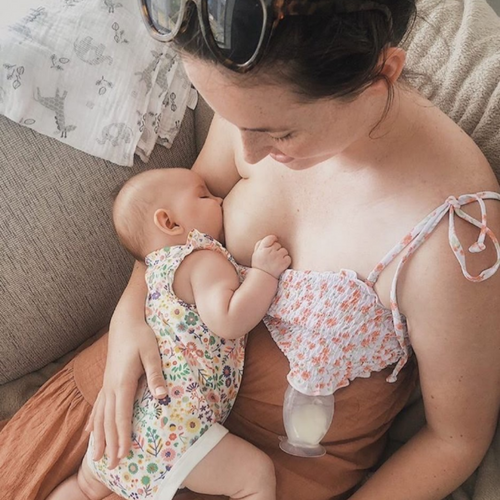Aliza Carr is a midwife and mental health specialist, who founded the online platform Bumpnbub to educate, support and connect new parents.
We typically segment pregnancy into three trimesters, but today we want to chat about the period of time after you've given birth - "the fourth trimester." As a midwife, I believe that being prepared for your little one's arrival has a direct link to better coping with the life transition that follows after your beautiful baby is born.
Bleeding
After birth, it is normal to bleed (this is called lochia) for up to 4-6 weeks (though bleeding is generally less with a C-section). During the first 3-5 days, your bleeding will be heaviest as your uterus contracts a lot. Your midwife or obstetrician will monitor your blood loss, but if you are ever worried, always ask to be checked. Bleeding generally lightens after 1-2 weeks. Be sure to change your pad regularly to minimise the chances of any infections.
Your Body
When your baby is fully grown, the uterus stretches from a closed fist-size to the size of a fully grown baby. Once bub is born, the uterus contracts back to its pre-baby size over the course of about six weeks. However, a lot of this contracting is done in the first 24-48 hours after birth. You will notice when you breastfeed or pump that your uterus contracts and you feel 'contraction' pain again. Try a warm heat pack during this time as it can help with those strong afterbirth pains.
Learning to Breastfeed
If you choose to breastfeed or pump, you may experience tender breasts while your milk comes in. Generally, for the first three days after birth, you will have colostrum - otherwise known as 'liquid gold'. This is thick, yellow-coloured milk, and is incredible for your baby as it is very nutrient-dense and houses all of your antibodies. Between days 3-5 your milk usually comes in. You may find that your baby is frantically feeding on day/night 3 because they are letting your body know they are ready for your milk!
Often Mamas wake up feeling a bit flu-like, with full breasts - all sure signs your milk is in!
Breastfeeding is a LEARNT skill for you and your baby. Although it is natural, it is not always easy. You and your baby will find your rhythm. If you need help, remember there is ALWAYS help available. A lactation consultant or midwife can assist you - don't be afraid to ask. There are also products that can assist in helping you on your feeding journey such as the Haakaa Nipple Shields and Nipple Aspirators.
Some essential tips for the early days of breastfeeding are: stay hydrated and well-nourished, feed on demand if breastfeeding, skin-to-skin is amazing and rest as much as possible.
Sleep Deprivation + Hormones
What a combo, hey mama!
Be sure to get rest and sleep when you can. If possible, nap when your baby naps - everything else can wait. If you find your baby isn't settling and you can't even take a shower, try babywearing or swaddling your little one nice and tight. This can give you some much-needed nap time, while baby feels snug and secure.
Remember mama - you have just given birth, you are producing milk and feeding your baby, all while trying to recover (with a lack of sleep). Talk about an emotional ride!
Take the time to know and understand your emotions, as a new baby can bring up a huge amount of emotional turbulence for you. Sit with it, acknowledge it and work through it without dismissal.
Baby blues are very common for new mothers. However, it is important for you and your partner to be aware of baby blues progressing into something more. Postnatal depression is a very real and serious issue. If you feel that you may be experiencing this, or any other perinatal mental health issues, speak up. Tell your partner, and book in to discuss this with your GP as soon as possible.
Your Village
 We all know the quote "It takes a village to raise a child". Nothing could be more accurate than that. Build your community during pregnancy, if not before. Knowing other pregnant mamas or women who have babies is so valuable and important. Having someone to message at 3AM when your baby is nursing and you are exhausted and overwhelmed can be a lifesaver. If you can, try to schedule a daily outing once you are physically able - this will help your mental health enormously.
We all know the quote "It takes a village to raise a child". Nothing could be more accurate than that. Build your community during pregnancy, if not before. Knowing other pregnant mamas or women who have babies is so valuable and important. Having someone to message at 3AM when your baby is nursing and you are exhausted and overwhelmed can be a lifesaver. If you can, try to schedule a daily outing once you are physically able - this will help your mental health enormously.
You've got this, mama. When it gets too hard, don't be afraid to ask your partner, friends and family for help. Don't be afraid to rest and accept the help of a family member who's offering to cook or clean. Welcome all of the support with open arms. You will be so glad you did!
Connect with us on Instagram and feel free to reach out to us if you have any questions.

